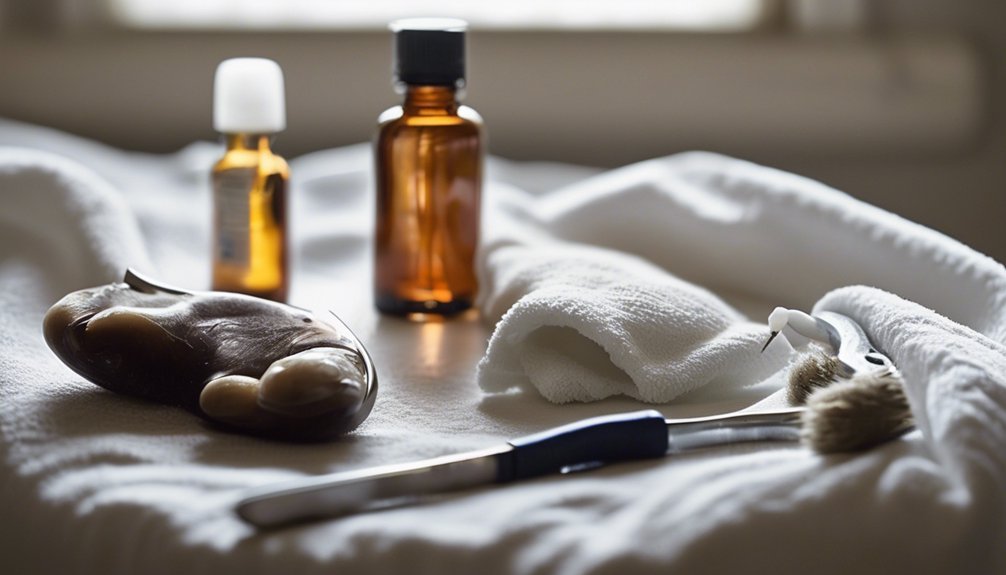
Skin infections can be a serious threat to your horse's health, yet simple preventive measures often go overlooked. By maintaining a consistent grooming routine and ensuring a clean living environment, you can significantly reduce the risk of infections. Understanding the importance of proper wound care and nutrition is also crucial. As you explore these strategies, you'll uncover essential practices that can safeguard your horse's skin and overall well-being.
Key Takeaways
- Regularly groom your horse to remove dirt, sweat, and debris, helping to prevent skin infections.
- Maintain a clean, dry, and well-ventilated stable environment to reduce humidity and pathogens.
- Monitor for allergies and irritants, addressing any symptoms promptly to avoid skin issues.
- Practice proper wound care by cleaning wounds thoroughly and applying sterile bandages to prevent infection.
- Provide a balanced diet rich in omega-3 fatty acids and ensure proper hydration to support skin health.
Understanding Skin Infections in Horses

Understanding skin infections in horses is crucial since these conditions can lead to discomfort and serious health issues if left untreated.
You'll encounter both bacterial infections and fungal infections, each presenting unique challenges. Bacterial infections, often resulting from wounds or poor hygiene, can cause localized swelling, redness, and discharge. You may notice your horse acting uncomfortable or sensitive in affected areas.
On the other hand, fungal infections thrive in damp environments and can manifest as itchy, flaky patches on the skin. Recognizing these signs early can help you implement appropriate care measures.
Regularly inspect your horse's skin and consult a veterinarian if you observe any symptoms. Taking these proactive steps ensures your horse stays healthy and comfortable.
Importance of Regular Grooming
Regular grooming is essential for maintaining your horse's skin health and preventing infections. By using effective grooming techniques, you can remove dirt, sweat, and dead skin, which can harbor harmful bacteria.
A soft brush is ideal for sensitive areas, while a curry comb can stimulate circulation and loosen debris. Regularly checking for cuts, abrasions, or irritations during grooming allows you to address potential issues before they escalate.
Additionally, grooming tools like hoof picks help keep your horse's hooves clean and free from thrush, a common infection. Establishing a consistent grooming routine not only promotes skin health but also strengthens the bond between you and your horse, ensuring they feel cared for and comfortable.
Choosing the Right Bedding and Environment

Choosing the right bedding and environment for your horse is crucial for preventing skin infections and promoting overall health. The bedding materials you select should be absorbent, dust-free, and comfortable to minimize moisture and irritants. Options like straw, shavings, or pellets can be effective, but ensure they're kept clean and dry.
Proper stable ventilation is equally important; it helps reduce humidity and airborne pathogens that could contribute to skin issues. Ensure your horse's living space has adequate airflow to keep it fresh and dry.
Regularly check for mold or dampness in bedding and maintain a clean environment to further protect your horse. These steps create a healthier habitat, reducing the risk of skin infections significantly.
Monitoring for Allergies and Irritants
While you may focus on your horse's diet and living conditions, keeping an eye out for allergies and irritants is equally essential for preventing skin infections. Regular allergy detection can make a significant difference in your horse's well-being. Watch for signs like itching, swelling, or unusual behavior.
| Symptoms | Possible Allergens | Potential Irritants |
|---|---|---|
| Itching | Pollen | Rough bedding |
| Swelling | Certain grains | Chemicals in grooming |
| Redness | Insect bites | Dust and mold |
| Excessive licking | Fungal spores | Unclean surroundings |
| Hair loss | Medications | Poorly designed tack |
Proper Wound Care and Management

Addressing allergies and irritants is vital, but proper wound care and management also play a significant role in preventing skin infections in horses.
Begin with thorough wound cleaning; use a gentle antiseptic solution to remove debris and bacteria. This initial step is crucial for promoting healing and reducing infection risk.
After cleaning, assess the wound for severity. If necessary, apply a sterile bandage to protect it from further injury and contamination. Ensure the bandage is snug but not too tight, allowing for proper circulation.
Regularly check the wound for signs of infection, such as swelling or discharge, and change the bandage as needed.
Nutrition and Its Role in Skin Health
Nutrition plays a crucial role in maintaining skin health in horses, as it directly impacts their immune system and overall well-being. Providing a balanced diet rich in essential nutrients is vital for promoting healthy skin.
Incorporate quality forage, grains, and nutritional supplements tailored to your horse's specific needs. Omega-3 fatty acids, for example, can enhance skin condition and reduce inflammation.
Additionally, maintaining proper hydration levels is essential; dehydration can lead to dry, flaky skin, making your horse more prone to infections. Regularly monitor your horse's water intake and consider adding electrolytes during hot weather or strenuous activities.
Frequently Asked Questions
Can Horses Get Skin Infections From Other Animals?
Yes, horses can get skin infections from other animals through cross species transmission. Close animal interactions, especially with infected pets or livestock, increase the risk, so monitoring their surroundings is essential for your horse's health.
How Do Weather Changes Affect Horse Skin Health?
You might not realize how much weather changes impact your horse's skin health. Increased humidity can create a breeding ground for bacteria, while extreme temperatures can lead to dryness and irritation. Stay vigilant for signs.
Are Certain Breeds More Prone to Skin Infections?
Certain breeds do show increased susceptibility to skin infections due to genetic factors. You'll notice that breeds with thinner skin or less hair often face more challenges, so understanding breed-specific risks is essential for effective care.
What Signs Indicate a Serious Skin Infection?
When it rains, it pours. If you notice swelling, redness, or discharge, your horse might show serious infection symptoms. Timely treatment options are crucial, so don't hesitate to consult a vet for proper care.
Can Stress Contribute to Skin Issues in Horses?
Yes, stress can significantly impact your horse's skin sensitivity. Effective stress management techniques, such as regular handling and a calm environment, help maintain their overall well-being and can reduce the risk of skin issues.
Conclusion
By following these guidelines, you'll help your horse's skin stay as healthy as a well-tuned machine. Regular grooming, clean bedding, and attentive wound care are essential steps in preventing infections. Don't overlook the importance of nutrition, as a balanced diet fuels your horse's immune system and skin health. Stay vigilant for allergens and irritants, and you'll create a protective shield around your horse, ensuring they remain comfortable and thriving in their environment.





